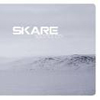 I get the sense that this Swedish group is clearly competent at what they do, having mastered the basic conceits of their chosen form. While their sound at times does seems to rely on rote formulae more than necessary, there are many moments where their potential shines.
I get the sense that this Swedish group is clearly competent at what they do, having mastered the basic conceits of their chosen form. While their sound at times does seems to rely on rote formulae more than necessary, there are many moments where their potential shines.
The main course on this album is found on the two long songs that clock in over 20 minutes. “To the Other Shore,” at under four, seems like an oddity attached to the beginning. As an appetizer it gives a taste of their methods without being filling.
“Through Wind and Broken Ice” begins with a soft but crunchy sound that reminds me of someone walking through frozen snow. It is also reminiscent of a track off the Silverman’s album Requiem Settings, where he used the sound of microphones being dragged across the snow to great effect. I don’t know if the guys in Skare were referencing that prior recording or not, but the quality of it is just as crisp. Soon the synthesizer becomes dominant. It drifts off on an aimless ramble. Vague voices creep in briefly and then disappear. Then I hear something like water percolating through a radiator, building up pressure. Eventually it all comes to a boil, about 15 minutes in, before settling back down for a long fade out, as a few notes are plunked on the piano, and sustained tone warbles in a high register.
While a great pop song starts right off with an immediate hook, it seems like a prerequisite for drone music to begin slowly, meandering around a bit and setting the mood, as the “The Snow Angel Factory” does. The piece could have just as easily started with the quick backwards flutter where the song shows its first signs of life. The rest of the 26 minute soundscape is quite immersive and holds my attention, but the first five minutes could have easily been chopped off to create a more succinct musical statement. At this point the song takes on a quality of stark oppression, creating a muddied feeling of spiritual dread that again finds its culmination in the rumble of piano noise that makes up segment of the song. Here the piano is more in the forefront, joined by what could be bowed metal. Whatever the scraping sounds may be, these last eight minutes of the song are the best on the album, leaving a favorable impression at its ending.
The drones here do not permeate me in the same visceral, surreal, and almost narcotic way that the pieces by some of my favorite artists working in this realm do, but this disc does fill up the room with pleasurable vibrations. The experience of Solstice City is like listening to some of the older broadcasts of the Hearts of Space radio show, but updated by the extensive use of field recordings layered in with static and other extensively processed material. Mathias Josefson and Per Ahlund have the ability to take things further out if they choose, to rely more on instinct and less on formula. I hope that they will.
samples:

